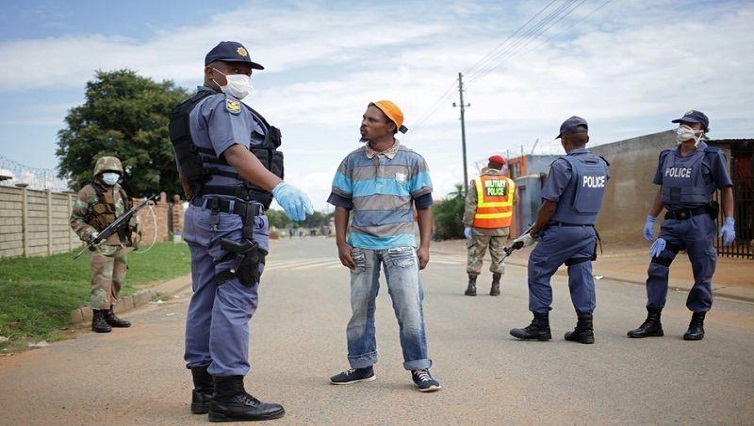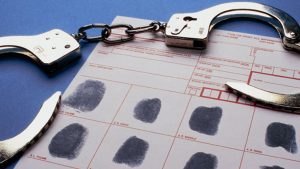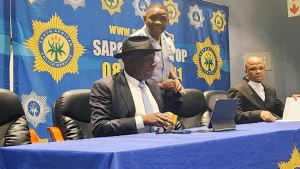Tens of thousands of police officers are on the frontline of the global war against COVID-19.
Many are in the unenviable position of fighting the pandemic, at the risk of their own lives and those of their families.
SABC News captures their voices in this weekly feature, COVID-19 Frontline Workers. This week, Digital News producer Lebo Tshangela (LT) speaks to a police constable, who is stationed in the Randburg area, about her experience with the coronavirus during the nationwide lockdown. She prefers to remain anonymous (A).
LT: South Africa’s lockdown began on March 27, but police officers are among those who provide essential services. I asked the constable about the type of arrests they made during the lockdown.
A: Violation of the Disaster Management Act; people gathering in mass number such as having a braai, people selling cigarettes and people selling alcohol during the lock down.
LT: Given the level of contact they have with the public as they perform their daily operations, it is not surprising that police officers are among those who have contracted the virus. Although exact numbers are not being released, several cases have been reported in at least three provinces. In the Western Cape, the Hermanus and Athlone Police Stations had to be closed after two police officers tested positive for the coronavirus, respectively. The 10111 emergency call centre in Maitland had to also seize operations and the Flying Squad was grounded after two staff members tested positive. Three other cases were reported last week, one in KwaZulu-Natal and two more in Gauteng. It may be part of the resistance one builds up when dealing with crime, but Anonymous doesn’t seem as rattled as many others do.
A: I have not encountered that really or maybe I do not take it to heart that this person might have the coronavirus. If I die I die. Coronavirus or no coronavirus. To me it’s just another day at work. I initially thought it would give me panic but nope it’s just another day however less crime and less complainants. But obviously contracting the virus is a fear and a possibility that I am conscious of… There are few risks, like we share cars, we load suspects, complainants and witnesses and hospital guard which is a nightmare.
LT: At the time of publishing this article, the number of COVID-19 cases in South African prisons had risen to 119, according to the Department of Correctional Services. Over the weekend, a prison official in Worcester in the Western Cape tested positive brining to eight the number of officials infected in that province. As a police constable, Anonymous says she is concerned that suspects in the holding cells might infect each other.
A: As it stands, there are 50 arrested persons at my police station. The chances of contracting the virus are high, but then again I signed up for it. I signed up to serve the country.
INFOGRAPHIC: COVID-19 cases in SA prisons:

LT: Hundreds of people have been arrested around the country for lockdown non-compliance, especially as relating to gathering illegally. Anonymous says compliance is low in townships.
A: With the area that I work in, my area is divided into four sectors, sector one being Westbury, Westdene and Coronation. Westdene and Coronation are complying. Westbury obviously because it’s more of a township than it is of a suburb, they are definitely not complying, Sector two being Newclare, Claremont, Newlands. Newclare and Claremont are not complying. In sector three which has areas like Greymont, Northcliff, Martinadale, Sophiatown, people are complying, relatively so. In Sophiatown, sector three, we are having difficulties with the children there, and the parents are not helping us out in terms of keeping their children. Fourth sector is Northcliff and we have no problems with Northcliff, East Town, Montgomery Park, in terms of compliance and to be honest in terms of area we get our most problems in areas that are more township-based.
LT: The national lockdown prohibited the sale and possession of alcohol outside of private homes. However, there were cases in which SAPS members seemed to be on the wrong side of the law. Seven police officers in the Western Cape were arrested for allegedly obtaining liquor in contravention of the COVID-19 regulations. In Mpumalanga, two police officers are kept in custody for allegedly illegally escorting three bakkies heavily loaded with liquor. Another notable case involved the arrest of two South African Breweries’ truck drivers for transporting liquor worth millions in Kagiso, in Gauteng’s West Rand. The police officer says crimes relating to alcohol consumption such as assault, have decreased.
A: There has been a huge decrease in crimes related to intoxication, in terms of drinking and driving. I can’t remember the last time we had an arrest for drinking and driving, it must be before the lockdown. In terms of assault to do grievous bodily harm, there is none of that taking place. In terms of trespassing, when someone is under the influence there is minimal, extreme minimal. So crimes related to intoxication have decreased, there has been a huge decrease in that, which is very helpful for us because we are not now running around opening case dockets.
LT: The officer says she takes precautions when visiting her family.
A: I live alone so I hardly see my family, I always make sure I take the right safety precautions before I go see them like, I do not see my family immediately after I leave work, I four days in, four days out, like right now I’m very sick and I’m at work so I make sure that I don’t see my people for a very long duration. It’s my first time being sick since the lockdown started, so I’m not sure what it is but I think it’s just a simple flu. So I stay away from my parents a lot so, my nieces, my nephews, my partner. So I have been seen them since the lockdown, if I do I make sure I take the safety measures. They have not mentioned anything about them being afraid I think because their faith is deep man, or maybe it’s just ignorance, I don’t know, is it great faith or ignorance? But they haven’t mentioned or shown any signs of them worrying about me in terms of contracting the virus.
LT: There is a shortage of Personal Protective Equipment worldwide. In South Africa, police officers at the police stations in Tembisa and Douglasdale, mooted a work boycott last week as two of their colleagues tested positive for COVID-19, prompting some to refuse going to work while others worked from the police parking area. Police and Prisons Civil Rights Union said an initial lack of protective gear might have rendered some officers susceptible to infection, arguing that officers were within their rights to demand to be tested to ensure the possible spread of the virus was contained. The officer says the Department of Health gave them masks, gloves and sanitiser, however officers chose not to wear the protective gear as it is uncomfortable.
A: In terms of PPE, in terms of protective gears, it is a disaster. It’s a complete disaster. To be quite honest the department of health did come in, they told us about the safety measures we need to take, what we have to wear when we have to work, they have given us a set of glasses, they gave us a mask each shift, they give us gloves. The department gave is a whole of sanitiser and a whole lot of sanitizer. I have seen the worst when it comes to masks. I have seen police member wearing a filthy mask, I must sure if they are not aware that you need to change your mask at least like twice a day. We are all given one set of glasses so we were not given like quite a number of glasses to change, just one set. In terms of gloves there is a shortage, we try to work around that but most of my members don’t even don’t wear protective gear that’s because they don’t feel comfortable wearing protective gear, its irritating really if you are not used to wearing gloves, you are not used to working wearing a mask and then all of a sudden you have to wear these things in order to survive, it’s not easy.
LT: The police constable says she has problems with wearing a mask because of sinusitis.
A: The protective gear is annoying, it’s completely annoying because we are not used to wearing protective gear, so it’s extremely annoying especially with me I have sinuses, so I cannot wear that mask for more than an hour. It is just horrible. We are completely not used to wearing those things. We don’t wear them. People are complaining about suffocation, it is not easy in terms of the gloves now, it is just annoying, maybe if we were more exposed and more used to wearing these things on a daily basis but now they are just say ‘here are the protective gears and you need to wear them’. It’s not easy especially since it’s limited.
LT: Strict regulations were announced on how courts will operate during the nationwide lockdown. These include the postponement of trials until after the lockdown and stipulations that persons arrested for a petty offence must be released on warning to be in court on a future date. She says she does not know what happens at court.
A: In terms of court processes, I cannot answer; I don’t know what happens in court. After I affect an arrest and I call them I tell the suspect to get a state lawyer and I’ll apply for a lawyer for you, that’s as far as I go. Most of the cases the cannot afford their own lawyer and they don’t want to have a lawyer until they appear in court, so they will just wait until the next day, because they 48 hours before they appear in front of a court, so they will wait 48 hours and then they will be in court within those prescribed hours. There is bail conditions, most of them do apply for police bail, initially police bail was R500, our station commander has reduced it to R300 now, so what happens is when you are arrested and detained you will be charged, you will await the holding cell, if you have a lawyer, you will contact your lawyer, if not you will apply for police bail on your own capacity and then you will pay the fee, well somebody will have to come in because most instances you can’t pay for your own bail, so you will contact the family member.
This is part 4 of frontline workers, see below for other editions:
Related: Part I :COVID-19 Frontline Workers: Q&A with a South African doctor
Related: Part II: COVID-19 Frontline Workers Part 2: South African nurses share stories
Related: Part III: COVID-19 Frontline Workers: Private clinic owner shares her story
INFOGRAPHIC: Reporting security forces:







